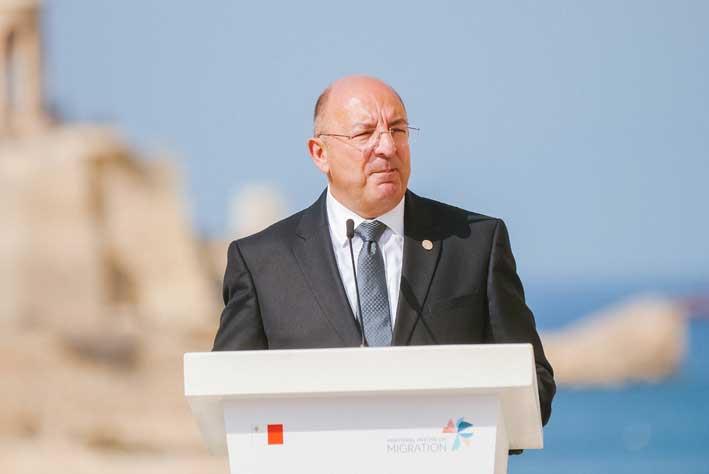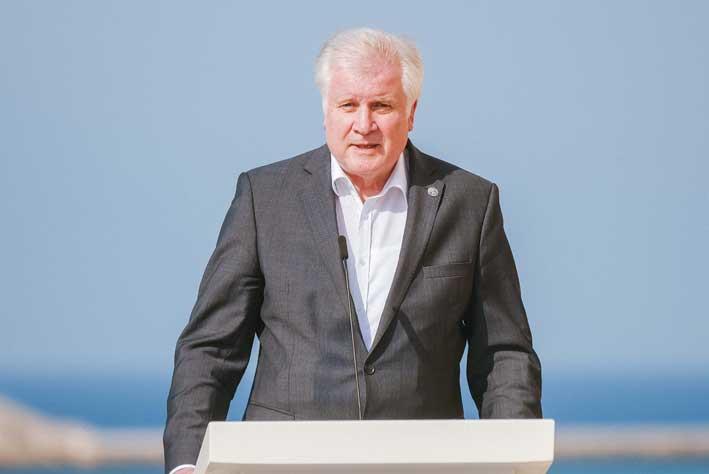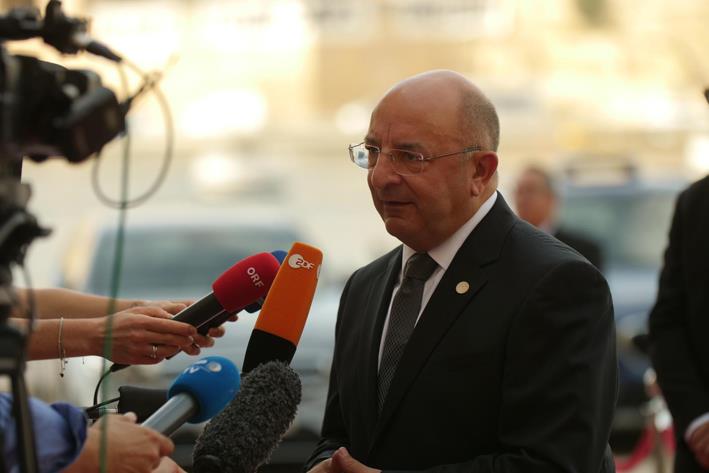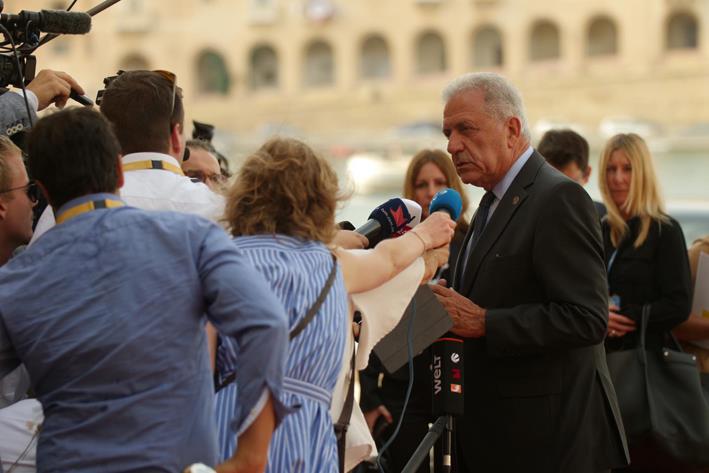An agreement on a set of “predictable and structural” arrangements for the disembarkation and relocation of migrants has been reached between the four countries on the frontline of the Mediterranean migration, it was announced on Monday.
Born out of a Ministerial Meeting on Migration held in Malta, the agreement sees four frontline countries; Malta, Italy, France, and Germany agree on a common paper on the issue of the disembarkation and relocation of migrants rescued at sea, which will now be presented to the Home Affairs Ministers from the rest of the European Union in Luxembourg on October 8.
The Interior Ministers of Malta, France, Italy, and Germany – Michael Farrugia, Christophe Castaner, Luciana Lamorgese, and Horst Seehofer – along with European Commissioner for Migration, Home Affairs and Citizenship Dimitris Avramopoulos and Finland’s Interior Minister Maria Ohisalo – whose country currently holds the EU Presidency – met in Malta to specifically discuss the way forward for the migration situation in the Mediterranean.
Addressing a press conference after the talks at Fort St. Angelo, all of the above emphasised their optimism that this is a step forward in reaching an agreement which will be more permanent and predictable than the ad-hoc manner in which cases involving the disembarkation of migrants, especially on NGO ships, have been dealt with.
The agreement, all of them emphasised, relies on the widespread participation of countries within the European Union, with Avramopoulos noting that it is the responsibility of all countries to come together and address the migratory situation and alleviate the burden being faced by countries such as Italy and Malta in the Mediterranean.

Indeed Avramopoulos said that he is “optimistic” about the outcome of the meeting, saying that all had agreed that the current ad-hoc approach with the European Commission coordination solidarity efforts is not sustainable. He said that good progress had been made towards a “predictable and structural set of temporary arrangements”, while also noting that the Commission will continue to provide active support operationally, financially, and politically and continue to work towards a European Common Asylum Policy.
Malta’s Home Affairs Minister Michael Farrugia said that the paper which was agreed upon will be presented in Luxembourg this coming October, and there it will be seen which countries are ready to support it and what amendments should be made.
“It is a process which was not easy, but I approached this with the philosophy that if everybody puts themselves in the shoes of the other minister, then we would be able to reach an agreement – and that’s what we did, and that’s why we have agreed on a common paper”, Farrugia said.

Finland’s Maria Ohisalo said that it is crucial for countries to move away from ship-by-ship arrangements and towards more predictable solutions, noting that today’s paper is a good pilot for this end and noting that it will be focused on disembarkations after search and rescue operations to show that these can be responded to through joint action.
She said that this will ensure that those being rescued may find a safe harbour without delay and ensure swift relocation on a voluntary basis to other member states. She said that the next important step is bring together as many member states as possible to take part in this agreement and to take shared responsibility for the situation.
Italy’s new Home Affairs Minister Luciana Lamorgese – who replaced the anti-migration hardliner Matteo Salvini in recent weeks following a government collapse – noted that the agreement would see new breakthroughs as compared to the previous period in the Mediterranean.
Germany’s Horst Seehofer said that this agreement will be the building blocks for a new European Common Asylum Policy, noting that without today’s agreement such a policy would not be possible.
“We found regulations which will help Malta and Italy, giving clear agreements for the procedures for the acceptance of migrants and refugees and clear time limits for distributing refugees - we are of the opinion that we must emphasise the distribution of refugees and not leave Malta and Italy alone”, Seehofer said.
He said that the numbers pertaining to distribution will be discussed in Luxembourg as it depends which states participate, but noted that today was an important step for European collaboration and that the chances for a Common European Asylum Policy have hence increased.

France’s Christophe Castaner meanwhile said that his country has always been committed to finding a solution for disembarkation which will support Malta and Italy, and noted that the next step is to mobilise all other European countries.
He said that there were other ambitious reforms for asylum requests in Europe in the pipeline which will concern both the first-entry countries and the second-entry countries of refugees.
Castaner noted that this will not see a massive flow of migrants once again, but it will make sure that Malta and Italy are not alone in the situation. “We want to accompany them and provide European solidarity; our target is to save lives and to show indispensable solidarity to our colleagues”, he said.
Measures regulating NGO rescue boats discussed during meeting - Farrugia
Speaking to journalists after the press conference, Farrugia said that the agreement depends on how many countries will participate especially with regards to the disembarkation of migrants from NGO boats and the relocation of those migrants.
He also noted that there will be a formula administered and calculated by the European Commission which will identify when a country is under stress due to a high number of rescues, and hence set in motion a process of relocation of those immigrants when a certain number is reached. This procedure will include when a country rescues migrants from their own Search and Rescue Zone.
He noted that consideration was also given on how to regulate NGO boats, even on their part of their flag states so that a license is given only to those organisations truly capable of carrying out rescues at sea. There will also be mechanisms to stop any “pull factors” that can occur following the agreement.
Asked whether the reliance on countries voluntarily taking part in this agreement was going to result in any tangible action, Farrugia acknowledged that certain countries were not pulling the same rope and lacked solidarity when it came to matters affecting human lives. He said that a re-discussion of the Dublin regulations was on the cards, and noted that he wished to see as much solidarity within Europe when it comes to human problems such as these as when it came to economic problems in the past.
Asked about Libya’s position in the matter, he said that Libya has its own responsibilities when it comes to search and rescue which is acknowledged and recognised by the EU, and noted that had it not been for them, hundreds more people would have drowned in the Mediterranean Sea.
Earlier: The participants in the high-level meeting gathered in Vittoriosa on Monday morning, with technical meetings ongoing throughout the morning and afternoon with the countries effectively trying to thrash out a new system for dealing with situations involving migrants rescued by NGO vessels and their disembarkation.
The meeting comes after over a year of near continuous incidents and standoffs which were each time solved by various ad-hoc agreements, and after a change in government in Italy.

A large banner with the words ‘EU, Get Your Ships Together’ adorned the bastions opposite the entrance to Fort St. Angelo. In a statement, Mission Lifeline – one of the NGOs engaged in rescuing migrants at sea – set out four demands which they would like to be taken into consideration during the meeting.
These four demands were namely for safe passage through the Mediterranean for all people fleeing their country, for the end of the agreement with the so called “Libyan coastguard”, for the end of the criminalisation of NGOs, and for the reform of the Dublin Regulations.
In the run up to the meeting, both France’s and Italy’s leaders Emmanuel Macron and Giuseppe Conte have said that immigrants saved in the Mediterranean should be split up automatically across countries in the European Union, and that countries who refuse to receive migrants should have a financial penalty imposed onto them.
A number of countries have said that they will back the reforms, but countries such as Hungary and Poland remain steadfastly against taking in any migrants.
Michael Farrugia meanwhile told The Malta Independent a week and a half ago that the ministers will be using the summit in an attempt to reach a common consensus about regulating disembarkations, relocations, and thresholds for automatic relocations if a country is under too much pressure due to numbers being disembarked.
He had noted that he hoped that the consensus reached during the meeting will be presented to the Council of Ministers in Luxembourg on 8 October.
Germany’s Seehofer meanwhile last week said that the meeting will look to work out a model for the distribution of refugees and migrants rescued at sea. He said that they will seek to develop a clear plan: "The new Italian government represents a great opportunity for Europe to create a concept when it comes to migration — in this case, rescued migrants. It would be a major mistake for the German government to miss such an opportunity.”

Seehofer was referring to the recent shift in government in Italy, where right-wing firebrand Matteo Salvini is no longer in government, and has been replaced as Interior Minister by the more neutral Lamorgese, who has already decided to let migrants land in Italy in one case since she took office.
The German Interior Minister said that his country is willing to take in 25% of all those rescued at sea by private organisations. AFP also report that France is willing to take in an identical number, while Italy is veering more to the 10% mark since they have already taken in thousands of migrants before.
Photos: Alenka Falzon